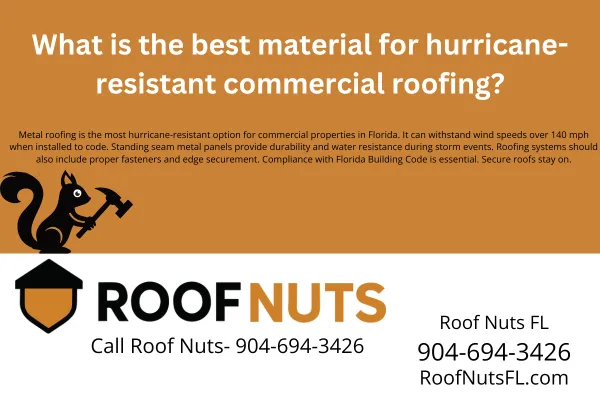
What is the best material for hurricane-resistant commercial roofing?
FAQ: What Is the Best Material for Hurricane-Resistant Commercial Roofing?
Q: What is the best roofing material for hurricane resistance on commercial buildings in Florida?
A:
Metal roofing—especially standing seam metal panels—is the top choice for commercial hurricane resistance in Florida. Here’s why:
Wind Resistance:
Withstands wind speeds over 140+ mph when installed according to the Florida Building Code.Water Protection:
Standing seam systems interlock without exposed fasteners, reducing water infiltration during wind-driven rain.Durability:
Metal roofing resists impact from debris, corrosion, and UV exposure, all common in Florida’s storm season.Code Compliance:
Florida law requires commercial roofing systems to be tested for wind uplift, edge securement, and anchoring. Metal systems meet and often exceed these standards.
Why Choose Metal Roofing for Commercial Buildings in Florida?
Engineered for Storm Zones
Metal roofing is one of the few commercial options rated for High-Velocity Hurricane Zones (HVHZ), like Miami-Dade and Broward Counties.Longevity & Low Maintenance
Properly installed metal roofs can last 40–60 years with minimal upkeep, reducing long-term cost.Insurance Discounts
Many insurance providers offer lower premiums for hurricane-rated systems, which includes compliant metal roofing.
How to Maximize Storm Resistance
To get the most out of your metal roofing system:
Use Rated Fasteners and Clips
Improper attachment is a common failure point during hurricanes. Use tested fastener systems with correct spacing.Secure Edges and Flashings
Edge zones are the most vulnerable areas in high winds. Florida Building Code (FBC) requires enhanced securement in these areas.Install Over Solid Decking
Structural metal panel systems should be installed over solid substrates like steel decking or plywood with underlayment for extra protection.
FAQs
Q: Does a metal roof make the building hotter?
No. In fact, many metal roofs come with reflective coatings that help reduce heat gain, keeping commercial buildings cooler and more energy-efficient.
Q: What’s the cost compared to other systems?
Metal roofing has a higher upfront cost than traditional membrane roofs (like TPO or modified bitumen), but offers longer lifespan, lower maintenance, and better storm protection.
Q: Can I install metal roofing over an old roof?
Sometimes. Florida Building Code allows this in limited cases, but it must still meet uplift resistance and edge securement standards. A full tear-off is often recommended for storm-prone areas.
Need help deciding the best option for your commercial property in Florida?
Call Roof Nuts at 904-694-3426 for expert advice and a free estimate.
We proudly serve Jacksonville, Miami, Orlando, Tampa, and all across Florida.
